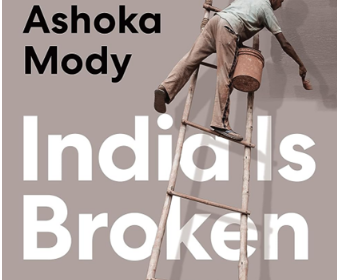Successive Indian leaders and officials have pushed India into an unchanging abyss. Today, more than seventy-five years after Independence, Indian democracy and economy are in a shambles”— “India will stay in its trap. Indian democracy will fail to deliver the public goods necessary for economic growth that benefits all. Good jobs will remain scarce. The lack of jobs will generate more social anger, which will further increase the political incentive for the quick-fire provision of visible goods and undermine democracy’s ability to work for a long-term jobs-rich future.”
This is the story told by Ashoka Mody of Princeton University, in his 2023 book (pictured).
The lived reality of a vast number of Indians is a never-ending struggle under the constant threat of humiliation and violence for two main reasons. First, “to employ all working-age Indians, the economy needs to create 200 million jobs over the next decade, an impossible order after the past decade of declining employment numbers.” And second, there is a lack of public goods for shared progress—education, health delivery, functioning cities, clean air and water, and a responsive and fair judiciary.
In conjunction with the good jobs crisis and public goods crisis, is the lives and livelihoods crisis. “Dying rivers could choke not just the economy but an entire way of life. And India’s climate crisis is here, threatening to compound the ravages of reckless environmental degradation.” Killer heatwaves, arid agricultural seasons, episodes of extreme rainfall, rising sea levels, cyclones and melting glaciers are all expected to increase in frequency and intensity.
These three crises persist due to moral traps. There is a cascading deterioration in social norms and accountability. Unaccountable politicians, with power and personal enrichment as their main goals, have sought easy short-run policy fixes for economic and social problems that require complex, long-term solutions. Citizens and businesses indulge in scamming and marauding behaviour. In such a milieu, democracy is easily trampled by autocracy.
The way out of this moral trap is suggested by the political scientist Robert Putnam. “We must move to an equilibrium in which everyone expects others to be honest, in which case most people will act honestly. That “honest equilibrium” will promote trust and cooperation to work together in the long-haul tasks of creating public goods and advancing sustainable development.” In other words, we need to go through a definitive transition from a “me-me-me” to a “we-we-we” society by building civic consciousness, tying public-spirited nongovernmental work with the authority and institutional resources of governments, and decentralization of governance.
How this will optimally come about from its non-existence, from ground zero, is a strange mystery, though.
All the same, Robert Putnam’s concern for the decline and fall of Civic America is matched by Ashoka Mody’s concern for the decline and fall of Civic India. Social capital and civic engagement refer to features of social life networks, norms, and trust that enable participants to act together more effectively to pursue shared objectives. Negative consequences of polity, economy and society are attributed to the degradation of social capital and civic engagement–unprecedented collapse in civic, social, associational, and political life. As such, the restoration of social capital will play a vital role in the functioning of societies with significant implications for various outcomes, including economic development, political participation, and overall social well-being.
This strand of thinking leads to the exploration of the Social Norms Theory and Development Economics that have become the basis for the World Development Report 2015.
However, Putnam’s theory of social capital has come under heavy fire from Marxist and Non-Marxist critics on various grounds, mentioning of which is not the concern here. Noteworthy, though, is what radical economists such as Ben Fine say. The social capital theory purports to steer a delicate course between neoliberalism and statism, whilst neglecting political economy, power and conflict. It is a “vulgar scholarship”. It overlooks power dynamics and structural inequalities within society. Social capital can be unequally distributed with marginalised groups facing barriers to access and participation. The emphasis on community-level social capital neglects the disparities and power imbalances that exist within and between communities. Further, the role of conflict and dissent in social capital formation is downplayed. This radical critique applies to Ashoka Mody’s analysis as well. In this case, the only way forward could be total development of society to be achieved by the principles propounded by the Union for Radical Political Economics. But this is also easier said than done.
References
Ben Fine. 2001. Social Capital versus Social Theory: Political Economy and Social Science at the Turn of the Millennium. Routledge.
Lina Eriksson. 2015. Social Norms Theory and Development Economics. Policy Research Working Paper 7450. World Bank Group. October.
Robert Putnam. 1996. Who Killed Civic America?, Prospect. March 20.
Tristan Claridge. 2015. Putnam on Social Capital—Democratic or Civic Perspective. Institute for Social Capital. April 24.
By Annavajhula J C Bose, PhD
Department of Economics, SRCC



